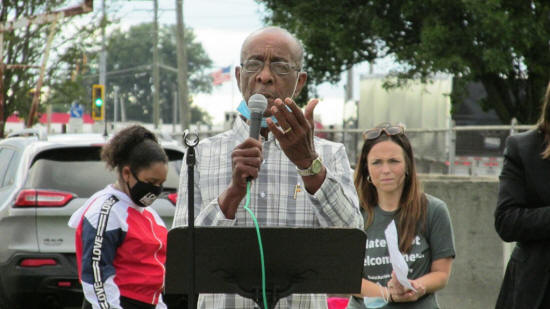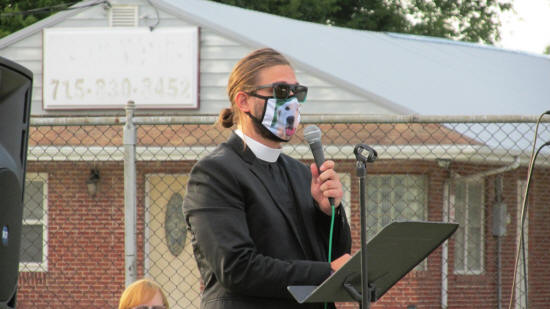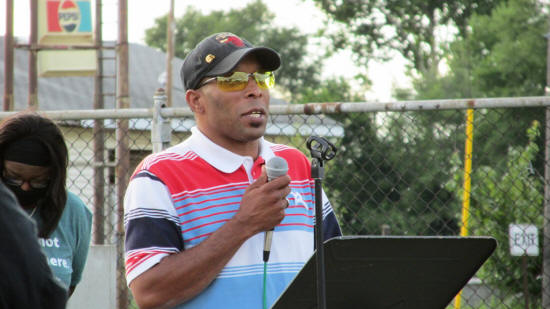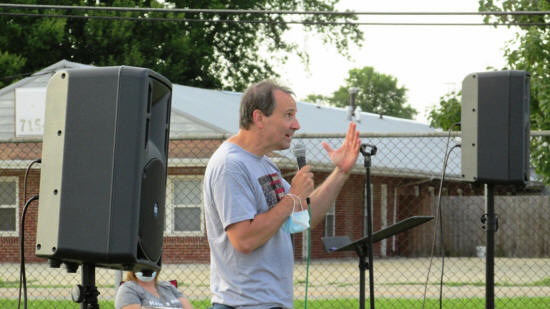|
 The billboard, which simply reads “Hate is not
welcome here,” started as an idea by former Logan County Board
member Jan Schumacher. The billboard, which simply reads “Hate is not
welcome here,” started as an idea by former Logan County Board
member Jan Schumacher.
Schumacher, who currently lives in Missouri, wanted
to do something positive after pamphlets promoting white supremacy
were distributed in central Illinois, including Lincoln. Schumacher
started a fund for the billboard, including a GoFundMe campaign. The
campaign goal was reached in a matter of hours. The donation page is
still active, and still accepting donations.
Several people spoke at the gathering. One of the speakers was
Jeanette Harris, a citizen of Lincoln for the last twelve years.
Harris repeatedly referred to the gathering as a celebration. “We
came to celebrate…that hate is not welcome here.” Harris said that
moments like this are not small for our community. “What I’m seeing,
I’ve never seen here before. Silence is no longer an option.”
“We all have work to do,” said Harris. “None of this is easy. I have
friends who have lost friends…and family members.”

Rev. Glenn Shelton of the Second Baptist Church
offered a prayer as part of his speech. Shelton, a resident of
Lincoln for more than thirty years, said his “heart is full” at the
sight of gatherings like the one at fairgrounds.
He also spoke of his own struggles as an African American in dealing
with hate from others in the community. “I saw Americans in this
city not being treated fairly. I started to speak out,” said
Shelton.
Shelton also spoke about his continuing efforts to make sure that
governing bodies and businesses do their part to support equal
access for customers and job seekers, not just on the basis of race,
but also in regard to disability. “I reminded them [business owners]
of the American Disability Act,” said Shelton. Shelton said he faced
hate and anger from people over his actions but it did not stop him.
“There wasn’t anybody standing with me,” said Shelton. “Now, we have
another generation rising up, picking up the banner, speaking up…and
declaring that hate is not welcome here.”

Ariel Dilworth, also a resident of Lincoln, spoke on her experiences
in educating herself on the issues facing African Americans.
Dilworth made mention of an early July Facebook post on the hatred
African Americans deal with, which came with a lot of negative
conversation in the comments. But she also received several messages
from people across the country who wanted to share similar stories
with her, and wanted her to know that her post actually gave them
hope, because she was now paying attention and seeing the injustice
that others had seen and experienced.
“My heart was broken, and honestly it still is…because Jesus makes
it so clear that a Christian’s job is to love God and love others,”
said Dilworth. Dilworth added that the Declaration of Independence
asserts that all men are created equal, yet members of the African
American community are hated and treated as unequal by so many
people and institutions. “Not once have I been afraid to walk at
night, or in a hoodie,” said Dilworth.
Dilworth also said it can be easy to feel discouraged, especially
when we try to address the attitudes and behaviors of others.
“People shrink down in righteous shock, appalled that we would make
such a statement.” Dilworth added that the grief expressed during
such times is also a good thing, as it also asks for oppressors to
acknowledge what they have done, and doesn’t let them hide from it.
Rev. Carolyn Coleman, also from the Second Baptist Church, also
spoke, and she focused on how long the fight against racism has
been. Coleman said that racism has always been a problem not just in
our community, but for the nation as a whole, for four hundred
years, stretching back to the early settlements in what would
eventually become the United States. Coleman said that for too long,
“racism has been a thorn in America’s side.”
“In the year of 2020, we are still fighting for the right to vote;
the right to live; the right not to die,” said Coleman. “As
uncomfortable as it may be to confront these issues, and as helpless
as it feels to affect change, this is where and how we make the
shift…right here, right now, tonight.”
“It will take each and every one of us to fervently call out racism
when it happens,” said Coleman.
[to top of second column] |


Another religious leader in the community in
attendance was Pastor Adam Quine of the First Presbyterian Church.
Quine, a resident of Lincoln for the last eight years, said that
attempts to drive the community apart have only resulted in a “cry
for solidarity and love throughout this city, this community, and
this county. I am proud to say that many of our community’s members
have taken pubic stands and voiced their words against a vile
presence in Lincoln.”

Quine also spoke on the actions of younger people in
the community. “Students are showing up and teaching us about
solidarity, sharing their experience, exposing their vulnerability,
and uniting and knitting us together.”
Quine said that he is proud to see Lincoln come together to grow as
a welcoming community for others. “We cannot pretend that this work
was easy, nor can we presume our work is complete,” said Quine. “We
must not forget that for every name we can save, there are countless
black lives that are forgotten in history’s pages.”
Quine also acknowledged the problematic history and present state of
other parts of the community. “What a silly sight it is to come to
the only city in the whole country named after the Great Emancipator
while he was alive and see the Confederate battle flag,” said Quine.
“Now is the time for words and actions.”
A good place to start taking a stand, and to continue promoting a
more welcoming atmosphere in the community, is to let people know
with signs and bumper stickers of their own that reinforce the work
done so far. “They invite us to put our love on display…they invite
discussion.”
Quine also added that the Presbyterian Church is offering supplies
for anyone with children who want to create their own artwork to
display on their lawn. Those who want to do so can contact the
church for more information.

Tim Rivera, a citizen of Lincoln, spoke about his own
struggles, including a conviction for a crime he did not commit. “I
stand before you a product of your town, and I’ve dealt with racism
most of my life.”

Ron Keller spoke on behalf of the city government and
the mayor. Keller said that the city council is putting together
language to form a publicly run commission to bring diverse voices
and experiences to the city council. Keller said he is “tired of
being reactive. We need to be proactive” on these issues. “This
commission will tell us how we can do a better job of being
welcoming and inclusive.”
“Mayor Welch wanted me to pass on to all of you that the city of
Lincoln supports this initiative,” said Keller. “In the first city
named for Abraham Lincoln, that should be a given.”
Kia Glenn and Quentin Brackenridge both sang for their part of the
event. Brackenridge performed a medley of songs, and Glenn performed
a song called “You know my name.”
A Facebook group, Resist Racism Logan County, has been at the
forefront of this movement within Logan County. They invite people
to get involved in any way they can to help make Lincoln feel
welcoming to everyone.
[Derek Hurley] |